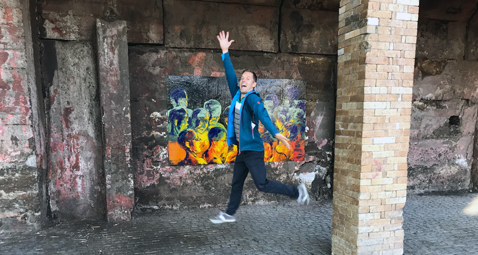
When did you graduate from FEE?
I completed my master's degree in 2011. In the same year, I started a combined (distance) doctoral study, which I did in parallel with my job. I finished my doctoral studies in 2018.
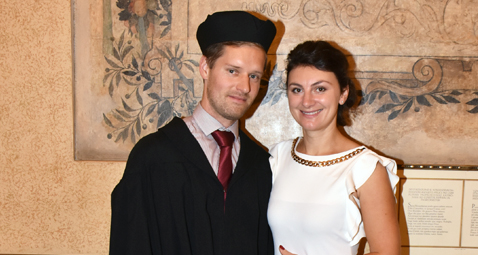
Which field did you study at FEE?
At the master's degree program in Industrial Electronics and Electromechanics, at the doctoral level Electronics.
Why did you decide to study at FEE?
I was a graduate of an eight-year high school. I remember that some classmates had a clear idea of where they would go next. Especially those who have decided to study medicine (perhaps because it is more of a mission than a profession).
My idea was not so clear. I applied to the Faculty of Economics, Electrical Engineering, and Mechanical Engineering. Thanks to my good grades, I would be accepted to all the mentioned faculties without admissions. So that didn't decide it for me.
In the end, I chose the Faculty of Electrical Engineering, and I definitely do not regret it. Studying opened up enormous possibilities for me. And today's high school students have the same or even greater opportunities.
How would you rate the approach and support from the school? For example, teachers, subject guarantors, etc.?
Overall, I have a very positive experience. The teachers were willing, offered additional consultations if necessary, and were happy to explain the issue again. I have not encountered anyone "coming to tell things" without being interested in our understanding of it.
The teachers were always very willing and helpful. We had many older professors. Some were before retirement or already at retirement age. I felt one thing in common with everyone: they wanted to pass on their lifelong professional experience to us. None of them definitely went to work to "improve their retirement." They took it as a mission. I am grateful to have been able to experience this era. They have a share of where I am today.
Of course, we had less exciting courses. We sometimes asked ourselves the classic question: "What is this for?" The truth is that we do not know in advance what we will need in future practice. I will be happy to share a specific example with you:
One of the courses, only credit, was 'Standards and regulations.' The name may evoke that it will not be so much fun. But somehow, we had to go through that and pass the final test. Paradoxically, norms are the thing that accompanies me in projects and tenders almost daily. Virtually every customer specification contains (shorter or longer) a list of standards according to which the product is to be designed, manufactured, tested, installed, and put into operation.
Of course, it is not necessary to know the standards by heart. But having a decent overview is an advantage or even a necessity. If the company wins the contract and you subsequently find that you forgot to exclude the applicability of specific standards, it will quickly spoil the joy of a new project. You can count on lengthy discussions with the customer, financial penalties, and maybe even withdrawal from the contract.
I just have the specifications for the tender in the USA on the table. The specification itself has almost 800 pages. Each main component (main switch, transformer, frequency converter, filter, high voltage cable, surge protection, etc.) is defined in a separate section starting with a long list of standards…
By the way, this is the less playful side of my work. But don't worry, it's not the only one.
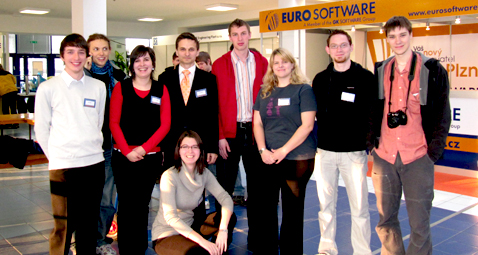
And what about the Study Office approach?
The Study Office has always been a great support to us. Whether it was changes in subjects, some necessary paperwork (e.g., confirmation of study for parents), or various scholarships. The human side has never been missing, which is undoubtedly important.
How do you evaluate the quality of the studied courses?
I am satisfied with the quality of the courses. There would be one or two exceptions. But as the saying goes: The exception confirms the rule. The faculty has a number of erudite experts. Also, most of them have a lot of practical experience, so teaching is not taken out of reality.
To confirm my words, I will share with you one bead:
When I returned to Pilsen for a few days during my working career, I sometimes liked to go to a lecture on a course that I had already completed. And even though I've heard practically everything before, I learned something new. To clarify (not to be considered a fanatic): I occasionally visited the faculty during my distance doctoral studies. These were consultations with teachers, picking up literature from the university library, etc. But sometimes, I also went to a lecture that was not directly related to the topic of my research work.
I'm still a little philosophical… The quality of the courses is definitely essential, but it's only half the battle. The other half is in the hands of the students. How they prepare during the semester. Whether they at least roughly remember the previous lecture. If they prepare tasks independently or downloads them somewhere on the network...
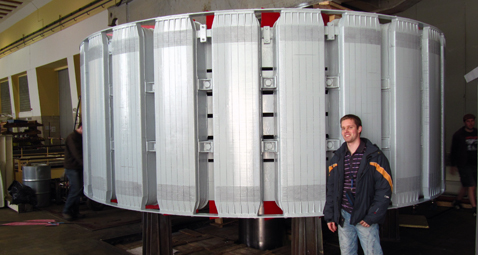
I don't want to do a moral sermon to anyone, but the fact is that everyone does the study for themselves. University, resp. the Faculty will give you options. Then it's up to you how you use them. You also can't become a piano virtuoso by buying the best and most expensive piano on the market. You will become a regular honest exercise. Faculty is such a piano, but you should play it - regularly, intensively, over and over again.
At student age, people often do not have a complete life perspective. I illustrate this with the example of foreign languages. I have many friends, both in the Czech Republic and abroad, who struggled with teaching foreign languages during their studies. Some tried to cheat it and slip through the object in every possible way. Later, as employees, they pay for private language courses and try to catch up. From my point of view, it's a shame. Language courses are not cheap. And even if you need to be paid by your employer as one of the company's bonuses, you won't have as much time and energy at work and other duties. Despite the fact that the older a person is, the worse his ability to learn new things (and especially languages). There may be exceptions, but in general, I think this is true. It would be much more effective to learn the language properly while studying. In addition, it will open up the opportunity for you to study foreign professional literature, and you will not have an excuse to go to a foreign internship or study stay.
Did you use the opportunity to participate in research activities during your studies at FEE?
There were several such possibilities during my studies. Now there will probably be even more for students, thanks to RICE, which was still under construction in my time. I would recommend everyone to use this option. Students often work on part-time jobs in parallel with their studies. That's how I had it, and the part-time jobs were practically unrelated to my field. I do not regret it. Even though it was more or less unprofessional work, it is all an experience. And it will make you plan your time better and be more productive. At the same time, I would highly recommend getting involved in research. Even if the financial reward there was lower than on a classic part-time job or even none. It is an experience for the future, and no one will take it from you.
Did you have a job outside the Faculty during your studies? Did you use internships during your studies, participate in activities at the Faculty?
During the classic full-time study, I had various part-time jobs. The scope of work was very different. It was mostly an unprofessional activity, from mowing the grass and cleaning industrial halls through various surveys to the sale of electric hand tools (finally something related to electricity).
When introducing an electronic toll for trucks (some 13-14 years ago), I assisted drivers at a gas station near the border with Germany. The lady in the employment agency was satisfied that I spoke English and German. They say there is a better chance that I will talk to them...
Most of the time at the gas station, I had nothing to do, and when the first truck driver finally needed to help, it was a Romanian who spoke only Romanian.
The least meaningful part-time job was one afternoon, when we unpacked the pallets with Coca-Cola bottles, glued the labels in French on, and then repacked the pallets in shrink wrap. It was just a one-time part-time job and an excellent reminder that I would like a job that makes some deeper sense in the future.
For the last two years of my studies, I was a member of the IAESTE organization, operating at the UWB. This international organization arranges internships and exchanges for students of technical disciplines.
It is a unique opportunity, for example, to travel abroad during the summer holidays and work there for several weeks or months on an internship in a company or, for instance, at a research institute of a foreign university. I would recommend this option to everyone. I personally applied for an internship in Hungary with an American company that has a development center there. But in the end, the interview showed that they want to move smoothly from the internship to full-time employment, and I already had a contract signed elsewhere...
However, most of my colleagues traveled this way, some even more than once, and everyone was excited.
The exchange program was the main point of our work at IAESTE, but in addition, we also organized the Job Fair. Here students have the opportunity to meet future employers, get the topic of a bachelor's or master's thesis, or perhaps the possibility of an internship.
Did the UWB and FEE help you specifically with the development of your skills for your future career? For example, domestic and foreign internships, language courses, etc.? Do you remember a specific example?
I already spoke foreign languages - in my case English and German - quite well after graduating from high school. However, not all my classmates were equally good at it. Foreign languages remain a problem for many Czech (technical) students, and it is a pity. They limit themselves. I'm not a fan of overestimating the role of foreign languages. At any technical faculty, technical subjects are, of course, the basis. Of course, foreign languages are also important. However, I see them more as a necessary prerequisite, no matter what field you study. In Scandinavia, almost everyone speaks fluent English - not just people with a university degree. On a business trip to India, among other things, I was struck by one thing in particular: Poor Indians living in all sorts of shacks spoke fluent English. Of course, English is the official language in India, but even so… People without education speak not only their local language but also English.
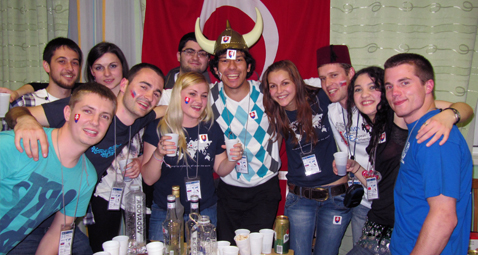
When I joined the company in 2011, several Indians came to us for various trainings and "exchange stays." The goal was to perform simpler engineering work when they returned to India. Today, about ten years later, many senior management positions are filled by Indians. In particular, I think that two things help them to do so: firstly, an excellent knowledge of English and, secondly, the ability to learn. The fact that they come from poorer conditions is, paradoxically, their great competitive advantage. They are generally far more motivated to study, learn and work out than students and young people in the West in general. Of course, this is not just about Indians. It is similar to the Chinese, Pakistanis, Vietnamese, etc. We also know this from the Czech environment. At grammar school, our Vietnamese classmates were modeled as the most diligent students.
Exchange stays are also a great thing. I mean Erasmus-type programs. The Faculty had, and I assume still is, the opportunity to participate in these stays. However, and this is quite sad, the interest from students was not so great. And it was an advantage for me. I applied for a semester abroad and was immediately selected. Why? Supply exceeded demand. This is not the case everywhere. There are many more people interested in other schools, there are selection procedures for study stays, and the chances of success are not so great. So I highly recommend it to everyone.
My friend and I were in Germany. Actually, only in Bavaria, just outside the border. The stay was only for a semester, but in a sense, it opened my eyes. The subjects were partly a repetition of what I already knew. But a few valuable observations:
- German students are not necessarily smarter than Czech (this was the first opening of the eyes, the second came at work, where we also have many German colleagues),
- however, the Germans have more discipline, thanks to which even the average can make it quite far,
- teaching is comparable to that in the Czech Republic. In this case, more emphasis was placed on practice, but this is probably due to the type of university, and I do not want to draw a general conclusion,
- the Germans have top-equipped laboratories (but we will probably catch up with them quickly - plus RICE is here),
- many German students struggle with English in the same way as Czech students.
Is there something that you lacked in the scope of study concerning future employment in the labor market?
As a recent graduate, you will never know and know everything, and it would be an illusion to think such a thing. But it is also not necessary. I am convinced that if a person works in a technical field and wants to stay on top, he must constantly continue his education and be interested in new trends. It is impossible to think that a person will learn something during five years of study and then the next 40 years of their working career will suffice. The question is whether studying will give you the necessary foundations and knowledge.
In the future, I can then read a professional article on a specific topic and deepen my knowledge in this area. Or attend a professional conference. The study reminded me of being able to understand an article or lecture.
How did you look for a job after graduation?
The job actually found me.
And how long did it take you to find it? Was it immediately right after graduation?
I had a signed contract with the employer before I graduated from my studies.
This is related to the fact that I already had previous experience with my employer and worked on a diploma thesis on a topic assigned by this company.
Do you work in the same region you come from?
No, I don't. I work abroad - in Switzerland, Canton of Aargau, about 30 km from Zurich.
Do you work in the field you studied?
Yes.
What is your current job position?
I am a systems engineer at Hitachi ABB Power Grids. I develop technical solutions of offers (tenders) and then the engineering itself in implementing the project.
What was your starting salary?
In terms of about 130 thousand.
What is your current monthly income now?
It is about 185 thousand in gross terms, in the net then about 144 thousand (depending on the current franc exchange rate). Besides, we have a 13th salary and a bonus depending on the results (the premium is always paid in the spring based on the previous year's result).
It must be said that Switzerland is known for its high cost of living. But the salary is, of course, quite sufficient. In those almost ten years, my monthly expenses did not exceed my income. On the contrary, I have surpluses and can help where it makes sense.
I will also add that I have never negotiated my salary with the company. I have a solid employer, and my salary was "automatically" increased several times.

What is your prospect for future career development?
The perspective depends a lot on me. In the company, each employee, together with their superior, sets goals for the given year. They can be areas of expertise - for example, creating a computer program in addition to everyday work, publishing an article at a conference, attending a specific training, etc. This also includes other skills, such as various soft skills. The form also fills in whether the employee is willing to move for work, whether he wants to stay in a technical position or profile himself more towards the manager… There are many possibilities.
I chose to stay as close to technology as possible rather than to develop a managerial career. Although I now have my own "baby" in parallel. In 2019, I founded my own company. Before that, of course, I had it officially approved by my employer to avoid conflicts of interest. It doesn't earn anything yet, and I have to subsidize it from my salary, but it's an invaluable experience. Suddenly you are the director, the head of marketing, the editor of the blog, and the accountant in one person. Last week I launched my first live webinars. Also, I own a device (transformer) weighing several tons. It's something to touch physically. Maybe this investment will never pay off for me. But with that risk, I went into business. It's worth the experience!
What is the biggest benefit for you from studying at FEE?
I learned the necessary basics for my daily work. I use knowledge from electrical machines, drives, power electronics, control technology, automatic drive control, measurement, etc. But I also like knowledge from other subjects that are not directly related to drives - for example, from power engineering.
The benefit of FEE is the overall combination of quality teaching, well-founded teachers, a modern environment (laboratories and lecture halls), and mastering the basic principles of technical thinking.
How do you evaluate the overall level and quality of education obtained at the UWB, i.e., FEE?
The level of FEE and UWB, in general, is very good. I have worked and still work in international teams. In my previous position, I was part of a 9-member team. One Swiss woman (women are no exception), two Germans, one Frenchman, one Belgian, one Brazilian, one Chinese, me, and our Norwegian boss. Nine people - eight nationalities. I never felt handicapped because of where I studied. On the contrary, I was able to assert myself.
One thing that could be further deepened at FEE is cooperation with industry (although, of course, I do not know the current state in detail - I can talk about how it was during my full-time study). FEE has always worked with companies from the industry, especially with some significant players. I think it would be beneficial if the cooperation was even more intensive and we also cooperated on smaller projects with smaller companies.
In connection with this question, I have one more topic. Czech education is often criticized because it is still based mainly on memorizing a large amount of information and facts. That it is said to be a relic from the times of Austria-Hungary. I must say that this does not apply to FEE. We have always been encouraged and motivated to think and really understand things. The point was not to memorize things.
One associate professor, whom I greatly appreciate, told us in preparation for the state exam: "It is nice that you will be able to integrate, but if you start working after study and you cannot explain why the asynchronous motor rotates, older colleagues will look at you like you were idiots." It's a quirky but clear statement. Most teachers appreciated our thorough understanding of the issue far more than memorizing it as a poem. It is the student's decision only to memorize it anyway. For some people, it is easier to learn something by heart than to try to understand it properly and be able to deduce it yourself.
During my studies, of course, the Internet was already very well-working, and you could find almost anything there. Today, with mobile devices, free wifi in many places, and very cheap data, there is definitely no point in learning the facts by heart without understanding. It has no value for employers, and logically, they will not pay their employees for it.
Would you recommend FEE to those interested in studying? And why?
Technical professions are and will undoubtedly remain in demand for the foreseeable future. At the same time, there is a long-term shortage of qualified technicians. Despite the current extraordinary situation in the world, there are a number of open technical positions in our company. We are resistant, and there have not been and will not be any redundancies due to coronavirus. Unfortunately, there is a shortage of technicians in Europe, so the company often fills vacancies with young engineers from Asia.
Studying at FEE will open the door to these interesting professions for students. The study itself will be accompanied by experienced teachers and experts from practice. Maybe one of you will be my colleague in the future.
What was your most significant job success?
There have been many successes over the years. One of the latest is a 200 MW propulsion (260,000 horsepower) for NASA's California testing facility. I started working on the tender at the end of 2016. And now, at the beginning of 2021, the order for the project has come.
The hardware itself will probably be ordered within the following year. Some projects simply need time. It is necessary to listen to the customer, read between the lines, meet the customer's needs, dispel their doubts, and, of course, also have a competitive offer. Previous references and experiences can also play a significant role.
Another success is the 60 MW pump drive for a pumped-storage power plant in Austria. For some reason, the tender was submitted to us with a delay. Our competitors were about two months ahead. The pump supplier refused to talk to us because he didn't believe we had a chance. He had already dealt with similar matters with our competitors from Germany and France two months ago.
Furthermore, there was not enough space at the installation site. It was an existing building, probably a listed building. Then came the problem with noise (which is quite crucial for Austrians). The solution of the bearings followed. The engine manufacturer suddenly engaged reverse gear and wanted to withdraw his offer. But in the end, the impossible worked out. Also, I am incredibly pleased that the converter transformer (approx. 75 MVA, 110 kV on the primary, four secondary windings, one tertiary for the connection of the filter-compensation device) will be from a traditional Pilsen company. And a switchboard from ABB in Brno. It will simply be a nice Czech track.
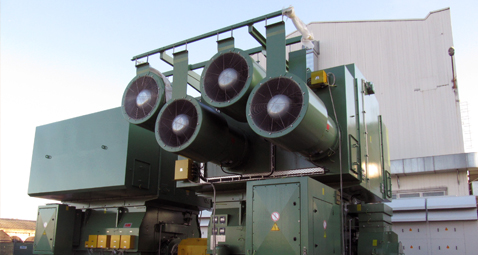
Have you experienced any failure? There were definitely some...
Of course, it belongs to life. My first business trip to the Austrian steelworks ended when the customer sent us home after the first day. It was bitter then. All the more so, because we didn't do anything downright wrong. We solved the vibrations of the drives, and we gradually managed to reduce them. In the late afternoon, the division boss invited us to a meeting to report to him on the results and our next steps. At first, everything was professional, but then he literally went nuts, shouted at us, and sent us home. What bothered him? The fact that I was only with the company for a year and a half and my service colleague six months less. He took it that the company did not take him seriously when he sent two such young engineers to his company, where the problem of the critically important blast furnace blower was being solved. He was expecting someone with gray hair, at least three titles before and after the name, and with at least 30 years of experience…
I remember how we sat depressed at dinner while our managers tried to call the plant's boss and persuade him to let us go to the company the next day to finish the job. Failed… A few weeks later, older colleagues went to the scene and took exactly the same steps we had planned. The problem has been solved. And this boss, who shouted at us that he would order drives from a competitor from Germany next time, sent us an order for another drive a few weeks later.
Such situations happen. Over time, you just laugh at that.
Less than a year later, I was on a business trip to India. The reason for the trip was completely different. We did short-circuit tests of the transformer. But coincidentally, elsewhere else, there were problems with vibrations on the compressor drive. So I flew from Bangalore to Mumbai instead of Zurich. Fortunately, the Austrian scenario did not recur, and the vibration problem was solved. Since then, the drive has been in operation for more than seven years and runs like a watch.
What are the most interesting places you visited during your business trips?
In my profession, travel is rather casual. Colleagues from the trade department travel a lot for customers, and colleagues from the service put the drives into operation in various ways around the world. I usually travel when a more complex tender with many technical specifics is being solved, which is just going to the finals. Alternatively, if we develop something together with the customer and a particular milestone has just been reached. Exceptionally, it is then the support of service technicians on site. Another reason may be an audit of our subcontractors or, for example, a technical conference.
Of the countries visited, India is definitely worth mentioning. Fortunately, I was in safe areas where there were no dangerous infections. Notable for me was a visit to a traditional restaurant, where instead of a plate, you get food served on a banana leaf. Of course, transport is unusual for a European. Traffic jams are common in big cities, which we know well. Unusually (for us), however, is that almost all drivers honk. It is not a sign of aggression. More like a cry: I'm here too. Most trucks (but also cars) have a "Horn please" sticker on the back. That speaks for itself.
Japan was also an exciting experience. I went on a 3-week tour there with a visit from large customers such as Mitsubishi, Hitachi, or Kawasaki. I managed the second phase of Japanese flowering roses. On one business trip, I rode a Japanese superexpress Shinkansen. And on the way back, we stopped for a few hours in the famous historic city of Kyoto. In Tokyo, I stayed for about two nights in a hotel right at the alleged busiest intersection in the world: Shibuya. And I ate the soup with the help of chopsticks - I still have to train a little bit until the next visit.
I also stayed in Norway for four months. So it was more of a work/exchange internship than a classic business trip. First, I was in Oslo for three months and finally in Bergen for a month. Norwegians are wonderful people - friendly, balanced, with a sense of family. And they are lovers of sports and staying in nature in all weathers. That's from them the phrase that there is no bad weather, just wrong clothes. Although Norway is rich, Norwegians remain modest. They don't play for anything; they don't show off. Many could learn a lot from them. In Norway, I did not focus on drives but instead on energy. Specifically, it was the electrification of drilling rigs for oil and gas. It was exciting, and it opened up other horizons for me. In the case of a low-voltage drive, the cable length between the inverter and the motor is of the order of several meters. In high-voltage drives, we usually reach lengths of up to several hundred meters. And in the case of these drilling rigs, there are submarine cables up to 200 km long.
